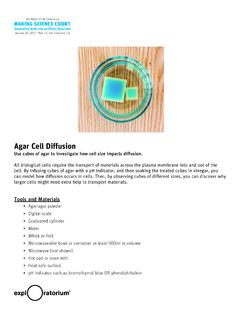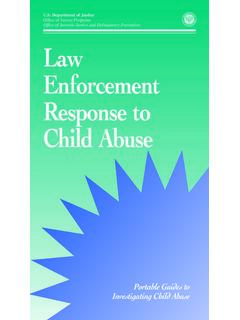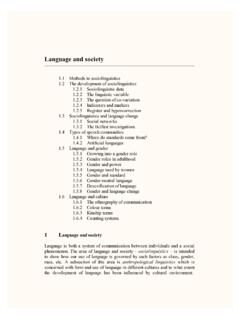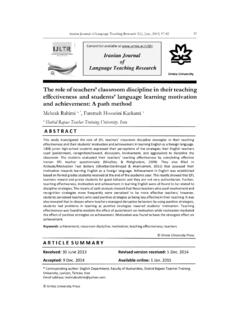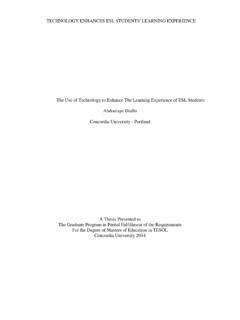Transcription of Developing Language in the Context of Science: A View from ...
1 Institute for Inquiry 1 meaningful Language for use learning occurs in contexts where students are required to communicate (speak, listen, read and write) about science. A practice-oriented science classroom can be a rich Language -learning as well as science-learning environment, provided teachers ensure that ELLs are supported to participate. Indeed it is a Language learning environment for all students, as the discipline itself brings patterns of discourse and terminology that are unfamiliar to most of them. In this Context , teacher knowledge about Language and Language learning support strategies can improve the overall science learning experience of all students, especially of ELLs.
2 Helen Quinn, Okhee Lee, Guadalupe Vald s. Language Demands and Opportunities in Relation to Next Generation Science Standards for English Language Learners: What Teachers Need to Know, Understanding Language , Stanford University. Developing Language in the Context of Science: A View from the Institute for Inquiry This paper presents the Institute for Inquiry s approach to integrating science and English Language development. It illuminates key features and foundational principles that underpin the design of our professional learning experiences.
3 The Institute for Inquiry s work is based on the premise that inquiry-based approaches to science require increased communication and sophisticated uses of Language , thereby engaging students in linguistic work that can support their English Language development. All students particularly English Language learners and others with limited literacy development encounter Language and literacy challenges and opportunities as they engage in doing science. Our conceptual framework takes this into account by recognizing that both science learning and Language development can be promoted by providing particular kinds of experiences and supports as students engage in doing science.
4 Traditionally, schools have considered science learning and Language learning to be very different subjects. However, recent research suggests that the integration of these seemingly disparate areas is advantageous to both. The direct and engaging experiences of inquiry-based science can provide a rich Context for the development of Language as students communicate about their observations and discoveries. Similarly, the use of Language to communicate about ideas is essential to the development of scientific understanding. Making sense of the world involves using and Developing Language to communicate meaning.
5 Increasingly, as states adopt or develop new standards in English Language acquisition, math, and science, there s an acknowledgement that content areas are important arenas in which both academic Language and Language skills for everyday use can and should be developed. There s a growing recognition of the importance of Developing Language for use, with the purpose of fostering understanding and communication of ideas, rather than a primary emphasis on isolated, decontextualized skill development that focuses on grammar and vocabulary.
6 Institute for Inquiry 2 For most teachers, this represents a major shift, challenging them to think differently about the nature of science learning and Language acquisition and to develop new classroom practices that effectively take advantage of their intersections. Given that teachers are often already overextended in their daily activities, and focused on meeting existing curricular demands, extensive support in the form of professional learning experiences and classroom materials is needed in order to help them make this shift.
7 The integration of English Language development and science holds great promise for advancing the achievement of English Language learners (ELLs), as well as providing connections to literacy that support English-only students. Recognizing these benefits, IFI embarked on a seven-year project (2008 2015) designed to experiment with the implementation of a district-wide professional development program for integrating science and ELD at elementary schools. For this project, we partnered with the Sonoma Valley Unified School District a five-school, semi-rural district located about 45 miles north of San Francisco.
8 The district s student population is approximately 55 percent ELLs, most of whom are native Spanish speakers. Through extensive collaboration between educators with different expertise and backgrounds (elementary school teachers, district administrators, museum-based science educators, and a university-based teacher educator specializing in ELLs),the Institute for Inquiry (IFI) has developed a conceptual framework where science learning is at the center and Language development is contextualized within making meaning of science experiences.
9 This framework serves as a foundation for the design of our professional learning experiences. If you were to observe the classroom of a Sonoma teacher who participated in IFI s professional development, you would notice many teaching practices that appear ordinary. For example, you might see a teacher asking their students different types of questions, introducing vocabulary, or charting and posting students ideas from a discussion. You might see students talking and working in groups. Though these practices may seem unremarkable in and of themselves, they are in fact instances of a deliberate approach designed to help ELLs develop Language within the Context of science.
10 What follows is a description of the elements of IFI s framework: Guiding Principles, Signature Experiences, Essential Supports, Contextualized Mini-Lessons, and a Spiral Model for Science as a Context for Developing Language . Institute for Inquiry 3 GUIDING PRINCIPLES FOR INTEGRATING SCIENCE AND Language DEVELOPMENT A set of guiding principles has come to reflect IFI s philosophical and pedagogical stance towards science learning and Language acquisition. These principles address potential misconceptions about Language development and have implications for classroom practice.




